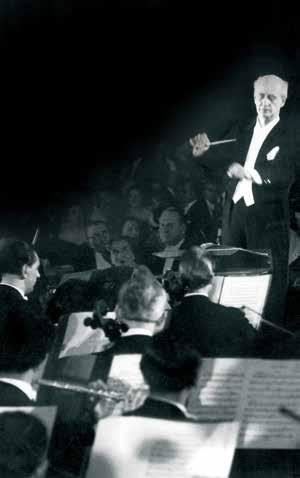
5 minute read
Find Joy amidst Liquor 酒中作樂
酒中作樂
EDIT/ 文 Joseph Tsui TRANSLATION/ 譯 Ziyang
Advertisement
Wilhelm Furtwängler 富特萬格勒
Wilhelm Furtwängler, in full Gustav 富特萬格勒,(1886 Heinrich Ernst Martin Wilhelm Furtwängler, 年 1 月 25 日生於德國柏林, (born Jan. 25, 1886, Berlin, Ger.—died Nov.30, 1954 年 11 月 30 日逝世, 1954, near Baden-Baden, W.Ger.), German 位於德國西部巴登巴登附 conductor, one of the great exponents of 近),德國指揮家,浪漫主 Romantic music. Known for his passionate, 義音樂的偉大倡導者之一。 romantic style, he excelled as a conductor 他以熱情、浪漫的風格著稱, of the works of Ludwig van Beethoven and 以指揮貝多芬及理查德瓦格 Richard Wagner. 納的作品而聞名。
At the beginning of the peculiar 2020, instead of going out and having fun, everyone has to stay home and spend some "alone" time, away from all the excitement out there. Looking at the on-line posts and information, I found people can still find a way to cheer themselves up in the uneventful life. It is like when savoring the liquor, we can seek joy amidst either sweetness or bitterness from the sip. Not until living such life for some days did I realize that I actually own so much spare time in my daily life to do what I want. Thanks to the advanced world of internet, we can get access to every information in the world. For me, liquor and music basically fulfill my recent life: having a few drinks alone at home satisfies my sense of taste while music contents my mind. I believe these two elements also spice up most people's lives. Looking back to the hard time in history, spiritual life has always been the savior of those who going through hardship in their real life, and the works of Wilhelm Furtwängler, the renowned German music conductor, can be regarded as one of the most classic demonstrations of spiritual life. Today, due to the decreasing number of people listening to records, physical record stores in Hong Kong have successively been closed down. However, Furtwängler's market appeal is still very strong despite his decease for over 60 years. Apart from continually re-publishing his limited pieces of recordings, the major record brands will constantly promote transcribed copies of better version strictly based on the research on the source of each master tape in order to solicit more business, which is a rare phenomenon among

other musicians in the record history. One of the reasons is obviously Furtwängler's great art achievements that left a legacy. Another reason explaining the situation is that this master was not fond of recording in the studios. Most of his tapes were recorded during his live shows. Therefore, some of his works would have more than one master tape because of live recording and copyright issues. Some passionate fans would even bring their own recording devices to make the "pirate" tapes, making the status of his recording heritage more complicated. On the other hand, the complication also triggers music lovers' increasing enthusiasm in pursuing and discovering different versions of his works, and I am definitely one of them. During Furtwängler's career life as a conductor for decades, the recordings he left can be traced back from 1920s to 1950s. Most of his conducting works contributed to the music by contemporary German and Austrian composers, among which Beethoven's works were an unsurpassable monument, representing the peak of Furtwängler's recordings. Among his recordings of Beethoven's works, "the Symphony No. 5" ran through his entire professional life. There were recordings of this work in each phase during Furtwängler's career from 1920s to 1954, the year he passed away. As is known to all, "the Symphony No. 5" is also called "Fate", and Beethoven's famous line "take fate by the throat" is widespread. In fact, there are so many recordings demonstrating this symphony throughout history, and it is not unusual to find excellent ones, but how Furtwängler's interpretation can still stand out from all of them? The musicians from Germany,
especially those who are from the same generation as Furtwängler, were greatly influenced by the war. Likewise, Furtwängler's recordings can be generally divided into three stages: "pre-war recordings", "wartime recordings" and "post-war recordings", which were largely distinct from one another. It is unquestionable that Wilhelm Furtwängler was the greatest conductor staying in Germany during the Nazi period. The dispute is whether he can be regarded as the greatest conductor in his day or the whole human history. As for the reasons why he did not leave the Nazi Germany or quitted his role in it, they can be solely discussed over an academic paper. For over 30 years, Furtwängler was the director of the Berlin Philharmonic Orchestra. Though the Orchestra's activities were once suspended after the war, it was still able to reach its glorious golden age under the leadership of a great master. Most of Furtwängler's "pre-war" recordings were Beethoven's No. 5 Symphony recorded around 1920s to 30s. What he demonstrated in the records at that stage was a style of unrestraint, a mixture of regulation and improvisation. However, due to the limitation of recording conditions at that time, his "pre-war" recordings were not perfect enough for him to reach the peak. During the war, it was a miracle that his recordings could even exist. According to much information, Furtwängler shouldered a kind of responsibility as a German intellectual that he thought he was obliged to stay in Germany in the darkest age and try his best to fight for Germany's future. Some might say he was politically naïve, same as many other artists, but his recordings during that period explained everything. Compared to the relatively well-disciplined "pre-war" recordings, his "wartime" recordings were so powerful like a mature giant smashing down everything around, which was unprecedented and outshining. Facing the wounded motherland destructed by the war, Furtwängler's records entered another level. Apart from a sense of sorrow heaviness, his "post-war" recordings also elicited deep thinking, inspiring his nation with the music. No language can describe music properly. Today, Wilhelm Furtwängler's records may also act as a lighthouse, sweeping away the haze and guiding us to move forward with strengths as in the old days. If you are intrigued, why not digging out Furtwängler's recordings on the internet by simply tapping at the keyboards, grabbing a drink, and travelling back in time by listening to his soul-stirring masterpieces? 2 020 新年伊始,人人都避開熱鬧。回看網上的很多消 息,人們就像品酒一樣,從甜甜的或者苦澀的味道中 作樂。 一段時間後,覺得自己的日常原來可以空出那麼多的時間出 來,做自己想做的事。多虧現今是一個網絡的世界,絕對可以讓人


足不出戶,便知世事。對我而言,家中獨酌一兩杯,可以餵飽我的 嘴,聆聽音樂,可以餵飽我的腦,兩者結合,便是我最近大致的生 活,相信這也是大家必不可少的生活調劑了吧。 回顧一下歷史上的艱難時期,現實生活的糟糕必然需要精神生 活來搭救。這當中最典型的例子,莫過於這位藝術家,德國的指揮 家 Wilhelm Furtwängler(富特萬格勒,1886-1954)。相信現 在聽唱片的人是越來越少,香港的實體唱片店也一間連著一間地倒 閉。然而富特萬格勒已經逝世超過一甲子,但市場號召力仍然非常 強勁。稍隔一段时间,各大唱片品牌就總會不斷重新出版其為數不 多的錄音。而且在其錄音母帶出處之考究上,不斷吹毛求疵,不斷 以推出更好的轉錄版本為招徠,這在唱片歷史上的其他音樂家當 中,實屬罕見。這裡主要的原因,其一當然是富氏的雋永藝術成就, 其二就是大師生前並不喜歡走進錄音室,所留下的錄音,大多是趁 現場演出之便所留下的。後者所留下的錄音,因為現場錄製以及版 權所有的緣故,出現不止一個母帶的情況,更有甚者,其時的狂熱 聽眾,甚至會私自攜帶隨身錄音設備進場錄製所謂的「海盜版」, 這令大師的錄音遺產狀況更加複雜,但是也增加了現在樂迷們追求 發掘的熱忱,我便是其中之瘋狂者。 富氏在其幾十年的指揮生涯當中,留下的錄音從 20 世紀 20 年代橫跨至 50 年代,主要集中在德奧作曲家當中,這其中貝多芬 是一座繞不過去的豐碑,也是富氏錄音之高峰。而大師留下的貝多 芬錄音當中,第五交響曲貫穿了大師的整個錄音生涯,從 20 年代 至大師去世那年(1954),每個時期都有留下第五交響曲的錄音。 眾所周知,這首交響曲的別名「命運」,以及貝多芬那句「扼住命 运的咽喉」聲名遠揚,歷史上留下的此曲錄音多如牛毛,能達出類 拔萃者也不在少數,那麼富氏對此曲的詮釋有何獨到?德國的音樂 家,尤其是富氏這一代的,戰爭對其藝術成就的影響是巨大的,富 氏的錄音同樣可籠統地分為「戰前」、「戰時」、「戰後」三個階 段,這三個階段間的區別是顯著的。無可厚非,在納粹德國那個非 常時期,富氏是留在德國的最偉大的指揮家,有爭議的是富氏是否 是他那個時代甚至是人類史上最偉大的指揮家。至於大師為何不離 開納粹德國以及其在納粹德國中扮演的角色,這簡直可以是一篇學 術論文了。 富氏作為柏林愛樂樂團三十餘年的總監,雖然戰後有所中斷, 但樂團作為大師的「親兵」,也在其帶領下達到最輝煌的黃金年代。 在戰前,主要是 20、30 年代留下的貝多芬第五交響曲的錄音,富 氏表現出的是灑脫的風範,規矩的框架填滿之餘,卻又有幾處神來 之筆,但由於錄音條件的限制,未能達到更好的境界,僅憑這個, 還幫助不了富氏登峰造極。但在戰爭年代,富氏的錄音,卻是一個 奇跡般的存在。有資料顯示富氏的內心有一種德國知識分子的責 任,其覺得有義務更要在黑暗的年代留在德國,盡自己的努力為德 意志的未來而努力。這或許是藝術家的政治幼稚,但其戰時留下的 錄音足以說明一切。比起戰前的稍顯規矩,這裡的錄音猶如一個成 熟的巨人散發出了狂野的力量,這是一種摧枯拉朽的體現,在富氏 之後的錄音當中前所未有,也足以傲視群雄。戰爭洗禮之後,面對 著滿目瘡痍的祖國,富氏的錄音又進入了另一個層面。這裡除了悲 哀的厚重外,更有一種深入的思考,用音樂去鼓舞著自己的民族。 語言形容音樂,始覺無力。富特萬格勒的錄音,在今天,或許 仍能像當年一樣,發揮燈塔的作用,為大家一掃陰霾,給予我們力 量繼續前行。 有興趣,不妨一邊舉起酒杯,一邊網上按幾下鍵盤,便可輕易 聆聽當年的驚心動魄。










